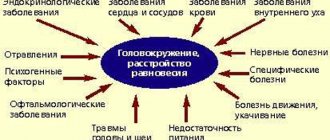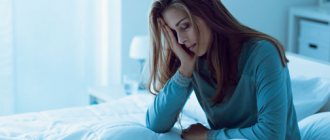What is insomnia
Insomnia, or in medical language - insomnia, is considered to be any deviation from normal sleep. Frequent awakenings in the middle of the night, prolonged (up to several hours) falling asleep and difficult awakenings, prolonged absence of sleep at night, shallow sleep - all this is considered to be manifestations of insomnia. Everyone has had periods in their life when they experienced the effects of insomnia on themselves. She especially likes to come before an important event, on the eve of a celebration or exam, when a person is making an important decision in life, to young mothers who hear the slightest rustle of the baby.
More often than not, insomnia is a byproduct of our nervous system, which is known to be unstable, especially in today's pace and lifestyle. The disease can have several types of manifestation.
Presomnia type of disorder
Characterized by prolonged falling asleep. At this time, a person experiences a physical need for rest, feels the desire to fall asleep, but cannot do this. The norm for falling asleep is 5-15 minutes. If after this time sleep has not occurred, we can talk about manifestations of insomnia. This is usually associated with neuropsychological disorders and occurs on the eve of exciting events or after important events. It occurs very often and usually goes away on its own as the emotional state improves.
Intrasomnic disorders
With this type of insomnia, sudden awakenings at night occur, followed by difficulty falling asleep or a complete lack of further sleep. This type of disorder makes sleep superficial, reminiscent of a normal nap and sensitive, when the sleeper is able to wake up from the slightest rustle. Insomnia in this case is caused by emotional swings, experiencing unpleasant events, mental disorders, sleep apnea and self-snoring, systemic diseases (thyroid gland, diabetes mellitus).
Postsomnia disorders
This type is even more common than the first. Its main symptom is a lack of strength and desire to open your eyes, a long awakening, weakness and fatigue even after a whole night of restful sleep. A person suffering from this type of insomnia feels drowsy throughout the day and fails when trying to replenish energy and fall asleep. In addition to psychological reasons, in this case there may be a deficiency of vitamins and minerals, late going to bed, blues and emotional stress. Usually, with this disorder, a person easily falls asleep and sleeps soundly at night, but waking up in the morning causes negative emotions and physical impotence.
But before diagnosing insomnia, it is worth assessing your habits, current state of affairs, and emotional state. Often the reason may lie on the surface.
Problems sleeping due to overexertion
For people who suffer from sleep disturbances due to physical or mental fatigue, the following infusions will help get rid of the problems:
- Mix equal parts black currant and rose hips (you can use both fresh and dry). Pour boiling water per 1 tbsp. l. mixture 400 ml. liquids. Leave in a thermos for about 6-7 hours. Strain the infusion and drink half a glass 3-4 times a day. The composition provides a greater effect if you drink it warm. If you wish, you can add a little honey for sweetness, but under no circumstances add sugar. This drink is highly fortified and well restores strength and relieves fatigue;
- Infuse 100 grams of horseradish roots into 1 liter of white wine for 10 days, shaking the mixture every day. After insisting, strain. Take 1 tbsp of medicine three times a day. spoon. To avoid stomach irritation, you should drink it with milk;
- propolis has a positive effect on the general condition of a person. Mix 90 ml of alcohol with 10 g. Propolis and leave for 14 days. If you need to quickly prepare the composition, you need to heat the dishes with alcohol in a water bath to 40-50°C, then add propolis. When cool, strain and the tincture is ready for use.
Causes of insomnia
Psycho-social stress. For example, this happens due to excessive anxiety about money and work, illness of children and loved ones. When crises happen in your personal life and you conduct an internal dialogue, bringing to perfection what you haven’t done in reality.
Depression
of a different nature, a state of blues and anxiety;
Increased brain activity
and emotional overarousal, both positive and negative. This often happens during sessions, before and after important business meetings, before trips and vacations, during periods of intense activity and multitasking. elderly age;
Discomfort
both mental and physical, the influence of extraneous sounds, light, noise. Darkness is one of the main conditions under which the sleep hormone melatonin is produced in sufficient quantities. The slightest lighting, watching TV or a phone monitor before bed can affect the quality of melatonin production and disrupt sleep. Often the cause of poor sleep can be discomfort caused by bedding - an uncomfortable pillow, too hard, too soft, uneven mattress. In this case, solving the problem becomes less problematic;
Non-compliance with the regime
day and biorhythms. For example, a shift work schedule, frequent time zone changes. This often happens with simple night owls, the so-called “night owls,” whose peak activity occurs in the afternoon and evening. It is difficult for them to go to bed on time, it is difficult for them to fall asleep and wake up at the appointed early hour, because a lot of time, energy and effort have been spent trying to sleep;
Alcohol
and caffeinated drinks. They also cause sleep disturbances. Especially if drinking such drinks happened in the evening. Needless to say how harmful they are for healthy sleep. Alcohol is wrongly considered by some to be a sedative and hypnotic. While it may actually make it easier to fall asleep, the quality of your sleep will suffer significantly. And all because alcohol inhibits the REM sleep phase. The same one during which the body’s strength is restored, when we dream and our brain organizes the information received. In addition, alcohol and caffeine can put a strain on the cardiovascular system, provoke snoring and sleep apnea, which act like a time bomb on the body, provoking both mental and functional disorders;
Apnea
- breathing disorders that can occur under the influence of substances, or due to the structural features of the nasopharynx, when obstacles appear in the air path in the form of a sticky palate and uvula, a deviated nasal septum, adenoids, cysts, allergies or a runny nose.
Taking medications (sympathomimetics, anorectics), drugs. Carefully read the instructions for any medications you take. One of the side effects may be increased excitability. It is for this reason that drugs such as echinacea, ginseng and many other adaptogens are not recommended to be taken in the afternoon, but rather from morning until lunch. Diseases and disorders.
Infectious and colds, fever, itchy skin and pain of various locations and origins;
Endocrine diseases
accompanied by hypoglycemia, frequent urination, dry mouth. Do you drink a glass of water before bed? Do you wake up to drink or from feeling hungry? It's time to change something;
Neurological diseases
such as dementia, Parkinson's disease, traumatic brain injury, neuroses or schizophrenia.
Consequences of insomnia
Before taking action, it is important to assess the scale of the disaster. Lack of quality sleep and the slightest disturbance lasting from a week to 10 days is not a reason to panic. The episodic nature of disorders of varying sleep duration occurs in everyone. But serious disorders that torment for months become chronic and have consequences.
- Problems concentrating,
- Difficulties with remembering and learning,
- Decreased performance
- Apathy or obsessiveness
- Development of depressive states
- Loss of interest in life
- Irritability and aggression
- Manifestation of somatic diseases
- Chronic fatigue
- Arterial pressure
- Headache
- Disorders of the cardiovascular system
- Excess weight
- Edema
- Deterioration in skin quality and overall appearance
And this is only a small part of the consequences of insomnia, which can be avoided by starting insomnia therapy or its prevention in time. The best remedies for insomnia
The best remedies for insomnia
Medicines
Melaxen
A synthetic analogue of the hormone melatonin, responsible for sleep. The drug quickly normalizes and correctly regulates biorhythms. Increases the depth and quality of sleep, eliminates periodic night awakenings. After a night with Melaxen, the feeling of weakness disappears, lethargy and fatigue disappear, dreams become bright and rich. Also suitable as an adaptogen when changing time zones. Reduces negative reactions to stress. Does not cause dependence or addiction.
Recommended course as a sleeping pill: 1 tablet 1 time per day before bedtime. As an adaptogen: the day before the expected departure and for 2-3 days after changing the time zone before bed.
Mälarena
The drug is an analogue of Melaxen. Also indicated for circadian rhythm disorders: flights with changes in time zones, violation of the daily routine, including shift work schedule. Helps eliminate weather dependence syndrome, fatigue, insomnia in older people, and reduces depressive syndrome.
Recommended course: For insomnia and sleep disorders, 1 tablet once a day, 30 minutes before bedtime. The duration of taking the drug is from 1.5 to 2 months. When changing time zones the day before departure and for 2-5 days after, 1 tablet 1 time per day before bed.
Melarithm
The effect on the body is similar to previous drugs. Normalizes circadian rhythms; Makes sleep deep and of high quality, eliminates night awakenings and promotes rapid fall asleep. But in addition to regulating sleep, melarhythm helps improve well-being, mood, and eliminates lethargy and morning drowsiness. It has a pronounced immunostimulating and antioxidant effect.
Recommended course: 1.5–3 mg 30 minutes before bedtime, 1 time per day. Duration of admission is no more than 7 days.
Herbal preparations
Nervochel
A homeopathic medicine designed to reduce increased nervous excitability and normalize sleep. Used for neuroses and menopause in women. Eliminates symptoms of depression and blues, VSD.
Recommended course: 2-3 weeks,
dissolve 1 tablet under the tongue 3 times a day 30 minutes before meals or 1 hour after meals.
Motherwort forte Evalar
Motherwort has a pronounced calming effect, strengthens the nerves, and puts the cardiovascular system in order. The advantage of the drug is that it additionally contains magnesium, and as is known, this microelement plays a key role in the functioning of the nervous system and eliminates muscle excitability. In combination with vitamin B6, which is the main link in the functioning of the nervous system, magnesium is better absorbed by the body. The drug performs a complex effect - it normalizes the emotional state, relieving anxiety and aggression, and at the same time improves sleep.
Recommended course: 3-4 times a day, 1 tablet for 3-6 weeks.
Novo-passit
Completely herbal preparation. Recommended for neurasthenia, increased anxiety, emotional instability, aggressiveness and irritation. Helps overcome fears, eliminate distraction and fatigue. Helps cope with headaches and mild forms of insomnia and periodic sleep disorders associated with psychological tension and stress. The advantage is that it is acceptable for children over 12 years of age.
Recommended course: 5 ml 3 times a day before meals with the prospect of increasing the dose to 10 ml per dose. If severe fatigue or depression occurs, it is necessary to reduce the morning and daily dose by 2 times and take 2.5 ml in the morning and afternoon and 5 ml in the evening. The interval between doses of the medicine should be 4-6 hours.
Knightwell
An excellent and effective drug, with many positive reviews. The herbal composition is enhanced with Magnesium and vitamin B6. Includes mechanisms that are responsible for maintaining normal sleep and deep sleep. Waking up in the morning becomes comfortable, light, without feeling groggy and tired. In addition, Nightwell promotes better concentration, memory and performance, because Magnesium in combination with vitamin B6 has a beneficial effect on the nervous system.
Recommended course: just 1 capsule before bedtime. Duration of treatment is 3 weeks.
What to take for sleep disorders: principles of pharmacotherapy in adults
All medications used for insomnia can be divided into several groups:
- tranquilizers of the benzodiazepine group (Phenazepam, Oxazepam, Lorazepam, Diazepam, etc.);
- synthetic analogues of melatonin;
- GABA receptor agonists;
- antidepressants (Trazodone, Amitriptyline, Mianserin, Mirtazapine, Agomelatine, etc.);
- H1-histamine receptor blockers;
- sedatives based on herbal components (Persen, Novo-Passit, valerian extract, etc.).
Benzodiazepines
For a long time, medications in this group were the “gold standard” for treating insomnia. The mechanism of their action is associated with increased activity of the main “inhibitory” neurotransmitter of the central nervous system, γ-aminobutyric acid (GABA). They have a pronounced therapeutic effect, but currently their practical use is limited due to the following disadvantages:
- long half-life (up to 12 hours), which causes severe daytime sleepiness;
- muscle relaxant effect, which limits their use in obstructive sleep apnea syndrome;
- development of addiction and tolerance with long-term use: to achieve the desired result, the patient requires an increasingly large dose of the drug, which often becomes the reason for the development of drug dependence.
To avoid adverse reactions, benzodiazepines are prescribed for no more than 4 weeks, and their sale from pharmacies without a prescription is prohibited.
Nonbenzodiazepine GABA receptor agonists
They are often called the Z-group by the first letters of their names: Zopiclone, Zolpidem, Zaleplon. These medications are also available by prescription only and are prescribed for 3-4 weeks. But they are distinguished from benzodiazepines by their relatively short half-life: from 1 to 5 hours. In this case, the duration of falling asleep is reduced by 20–25 minutes, and the duration of sleep increases by an hour on average.
Histamine receptor blockers
This class of fairly effective and safe medications includes Donormil tablets and Valocordin-Doxylamine drops. The advantages of these medications are the rapid development of the therapeutic effect (after 15–30 minutes), while the hypnotic effect persists for 7.5–8 hours, which allows you to avoid extremely unpleasant daytime sleepiness.
Therapy with H1-blockers occurs without the development of tolerance and without addiction. Contraindications to their use include pregnancy and lactation, benign prostatic hyperplasia, and angle-closure glaucoma.
Synthetic analogues of melatonin
Melatonin is a pineal gland hormone that regulates biological circadian rhythms. The sedative and sedative effect of drugs that contain artificially synthesized analogs of this substance is very weak, and the effect lasts up to 30 minutes to 2 hours. Therefore, they are prescribed when insomnia is caused by a violation of circadian rhythms, which often occurs during long-distance flights and time zone changes. But the use of melatonin does not replace the need to observe the rules of sleep hygiene and daily routine.
Antidepressants
Indicated when insomnia is combined with manifestations of depression, and it is often very difficult to establish which of the diseases arose first: either sleep disturbances provoked a depressive disorder, or vice versa. In such cases, antidepressants with a sedative effect are used. They are also prescribed for insomnia that occurs against the background of concomitant somatic pathologies.
How to get rid of insomnia
Any changes in life require time and effort. Internal effort and a real desire to change the situation for the better. To get rid of insomnia, you will have to reconsider your lifestyle, first of all, paying special attention to four pillars:
- Sleep hygiene.
This is not only water procedures and ritual teeth cleaning. Sleep hygiene is a broad concept. Stop eating and drinking at least 3 hours before bedtime; in the evening, try to use dim lighting; Avoid reading books, scrolling through social media feeds immediately before bed, and do not fall asleep with the TV on; At night, turn off electrical appliances in the bedroom, if any, turn off the sound and Internet on your smartphone; - Control of emotions.
Nerves are the main cause of all human troubles and joys. Like any instrument, nerves need tuning, prevention, cleaning and strengthening. It is important not only to make daily efforts to maintain your emotional state, but also to regularly support the nervous system with vitamins. Moreover, change your attitude towards yourself by starting to observe sleep hygiene - go to bed early, ventilate the bedroom, learn how to relax before bed, so that internal dialogues do not arise in your head as a consequence of the day. - Diet.
We are what we eat. The statement is absolutely true in matters of combating insomnia. Fatty, spicy, salty foods, fast food and abuse of sugar, sweet and alcoholic drinks can have such a strong impact on the body that insomnia very quickly comes to such belly celebrations. It is better to include pumpkin and pumpkin seeds, sesame seeds, spinach, cottage cheese in your diet - such food contains amino acids and microelements that have a beneficial effect on the nervous system, and therefore on the quality of sleep. - Taking care of your health.
Physical activity, sports and general activity help the body to be in good shape, which means maintaining the level of serotonin and endorphins in sufficient quantities so that the nervous system feels good. This means your sleep will be of high quality, calm and complete. But, doing physical exercise before bed is not the best idea, because at this moment the nervous system comes into a state of excitement. In the evening, breathing practices and yoga are best.
When is drug treatment for insomnia necessary?
Many therapists and neurologists make one very common mistake, which, unfortunately, often leads to dire consequences. When complaining of problems with sleep, sleeping pills are immediately prescribed, and if there is no effect from their use, few people think about the reasons for this phenomenon - they simply prescribe more potent pills for insomnia.
But the specialists of the Leto clinic practice a completely different approach. We pay great attention to examining the patient and identifying the cause of insomnia. As practice shows, in many cases, sleep disturbances are caused by factors that can be easily eliminated without medication.
When collecting anamnesis, doctors often find out that a person neglects his daily routine, in the evenings, lying in bed, playing on a smartphone until late, reading forums, watching videos, etc. Not the least important role is played by the quality of bed linen, pillows, mattresses, lighting, humidity, temperature in the bedroom, and sound insulation. And in the vast majority of cases, within a couple of weeks after correcting the daily routine, diet, and improving rest conditions, all sleep problems go away without taking any medications.
Another cause of insomnia is concomitant diseases, which are accompanied by chronic pain (for example, damage to the musculoskeletal system), an extremely unpleasant sensation of pulsation in the temples, chest, head, tachycardia (these are the majority of cardiovascular pathologies), and frequent urination, for example, with chronic cystitis. In such a situation, first of all, doctors treat the underlying disease, and drugs for insomnia are prescribed for a short period.
Indications for drug therapy
- a person rolls around in bed for at least half an hour before falling asleep;
- frequent awakenings at night, due to which the duration of rest is reduced by 30 minutes or more;
- waking up early in the morning 1–3 hours before the alarm goes off;
- due to insomnia, daily activities are disrupted: due to constant drowsiness and feelings of fatigue, a person is forced to limit daytime activity, performance decreases, concentration deteriorates, absent-mindedness and forgetfulness appear;
The listed disorders are the basis for prescribing drug therapy in the following cases:
- the patient has all the opportunities and conditions for sleep;
- problems occur at least three times a week;
- insomnia is not explained by the presence of another disease.











